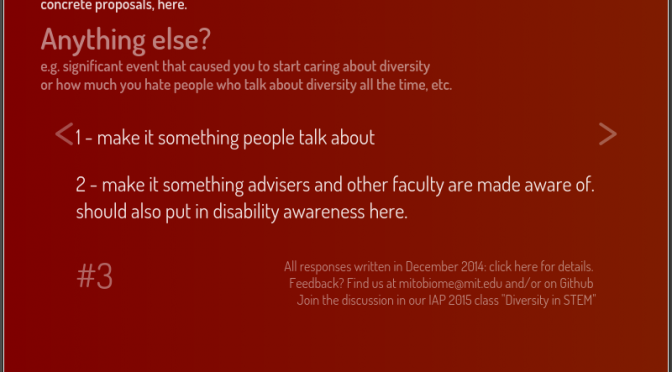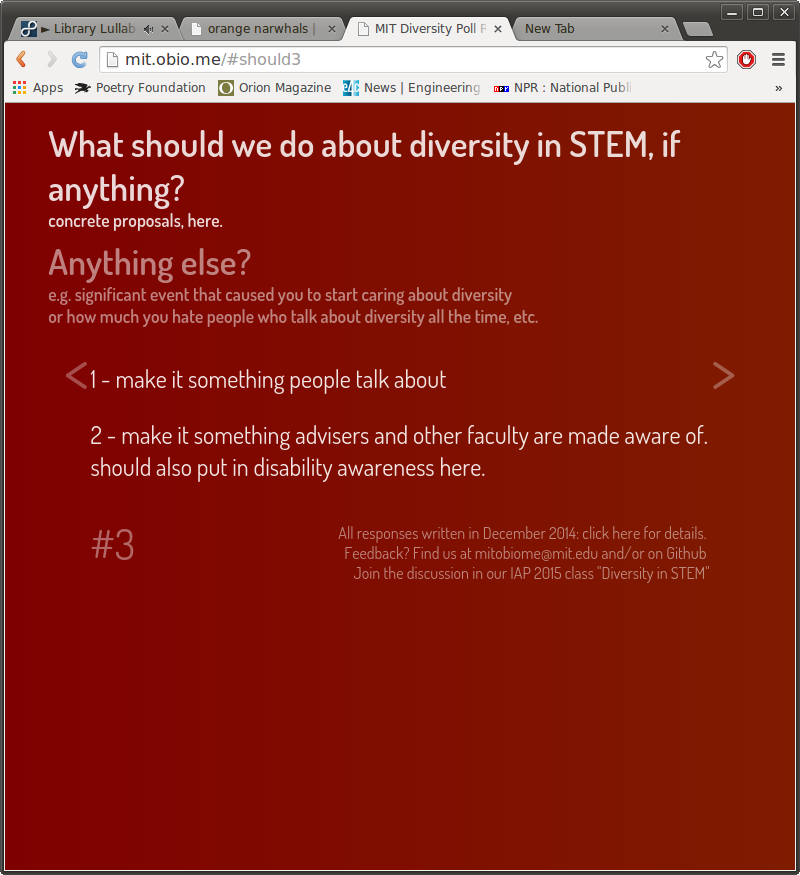HI INTERNET
poll
recently I was feeling grumpy so as usual I expressed my grumpiness by collecting data about the topic from my friends.
(Here is one poignant article that really articulates some of the current issues about diversity in STEM:
https://medium.com/thelist/the-other-side-of-diversity-1bb3de2f053e
I was surprised by how much I identified with this).
The written responses I compiled and sorted alphabetically (to remove ordering information), and are now displayed on this site:
http://mit.obio.me/ (created by Ned Burnell — it’s open-source, source on github ^^)
Anyway, I keep meaning to mine the data sometime to pull out some statistically insignificant yet interesting conclusions (I don’t know how to science, sadly).
The basic question I am curious about is
do the people who are most likely to be in power in the future (standins: grades and income, gender and race) care the least about diversity (standins: talk to people about it, rate it important, read about it, think about it).
(see appendix for more thoughts)
Mostly, it’s a little irritating sometimes to always be talking to the same people about these topics, and I am uncertain about what the cause for that is. Do people feel uncomfortable talking about these issues, do they not care, or what?
Another interesting anecdote is that a lot of my female friends don’t care about this problem.
Happily, what I learned from getting over 120 responses to the survey in 24 hours (from just three or four mailing lists: pika, EC, MITERS-keyholders, and some friends) is that a lot of people do care about this topic.
IAP
I decided to run an IAP class — hopefully some people will sign up for it.
Diversity in STEM: How racist and sexist are we, and why should we care?
This workshop aims to be a fun, productive, and provocative introduction to issues of diversity in STEM. We’ll start out with a no-holds-barred discussion about what we personally think about diversity in STEM (is it worth it? do we need it? should we care? why or why not?), examine where our beliefs come from (share personal experiences), and then review the scientific literature on this subject. From there, we will begin work on concrete project(s) to showcase diversity at MIT, as well as compile a report to MIT’s Institute Community and Equity Officer. On the final day, we’ll present our projects to each other, so make them fun and interesting!
The goal is not to push an agenda; the goal is to relate to and engage with each other, even if we have very different beliefs, as human beings who developed our beliefs though our experiences.
Possible projects:
* Cookies that visually display the statistics about diversity at MIT (statistical food)
* Short film about people’s experiences at MIT, about diverse people at MIT, or about what MIT people think about diversity
* Compelling website displaying a collection of quotes from the MIT community or results of polling MIT
* Game explaining recent scientific research into this topic
STEM
Other Internet
- The MIT Sexual Assault survey
http://dangph.am/SexualAssault/
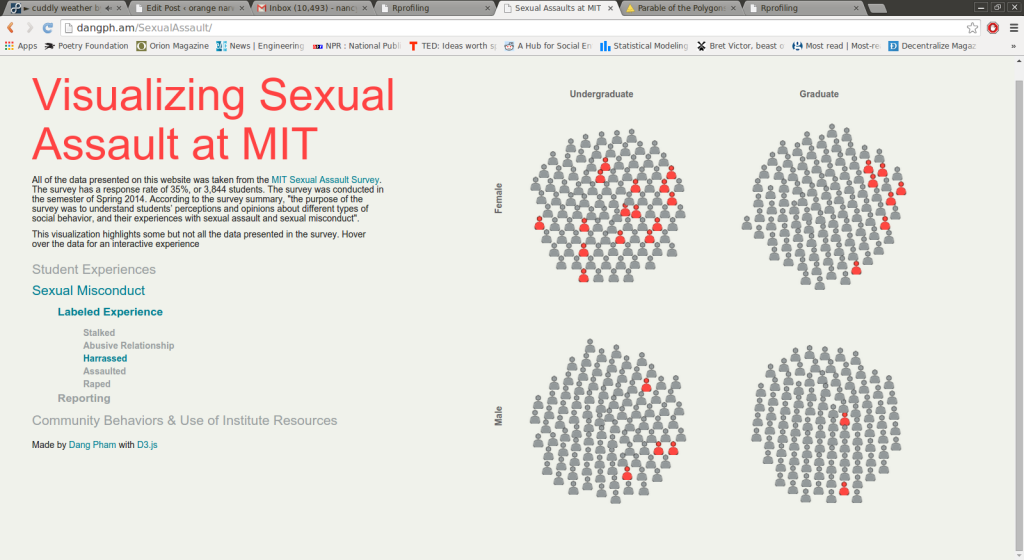
- Compounding of small bias
ncase.me/polygons/
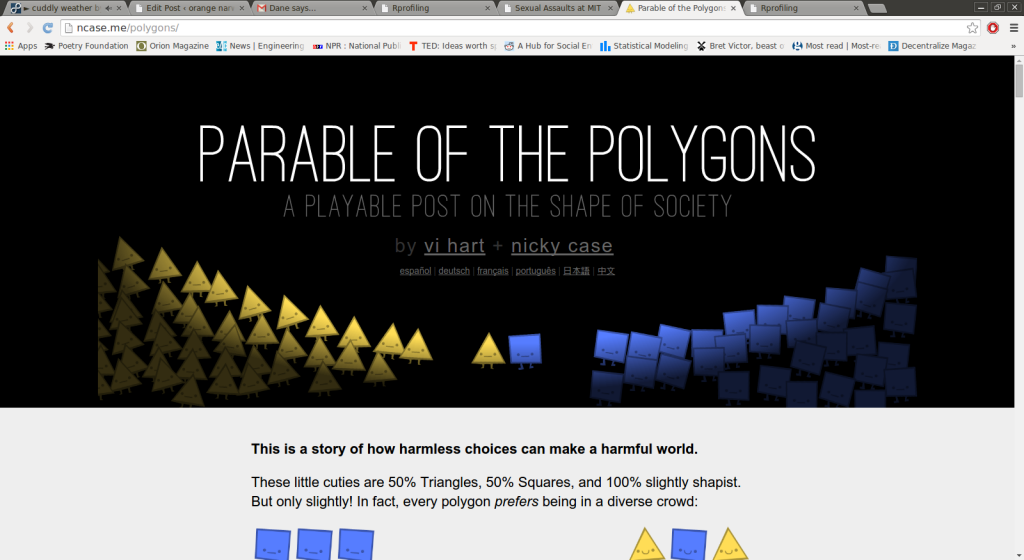
- Racial Profiling
http://mirthbottle.github.io/rprofiling/
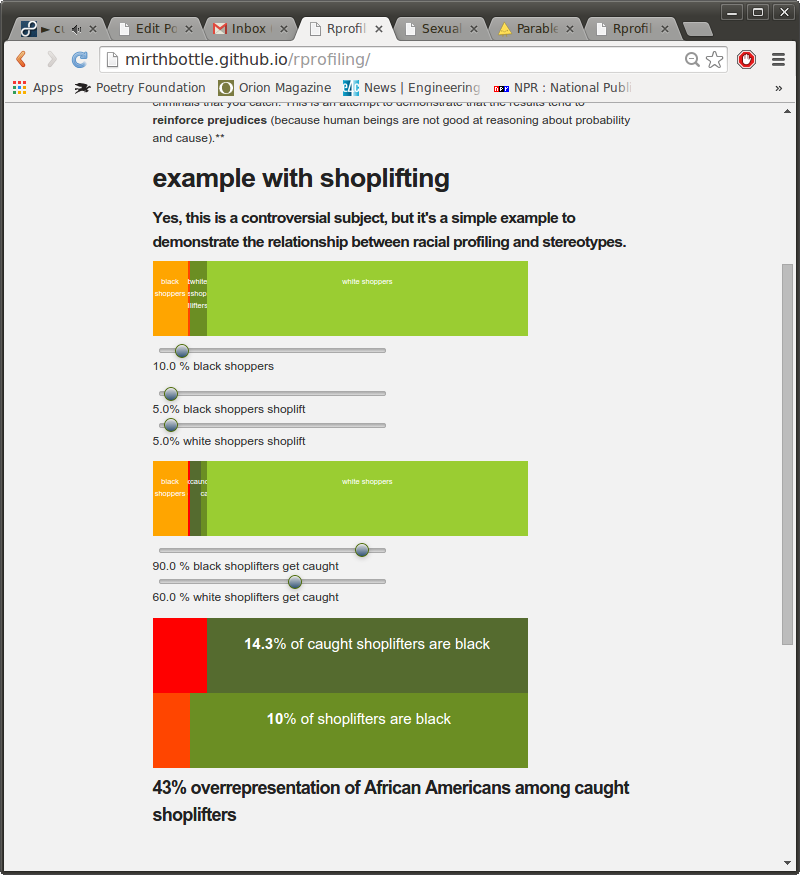
The latter I thought was better done than the first, in the sense that it provided a guided walkthrough of how to explore the data and what interesting conclusions we might draw from it instead of just dumping it in front of the user. See this article (Tell, Don’t Show) for some interesting thoughts on this.
appendix
other hypotheses to look at in the diversity form data:
- gender, race, and income, controlling for age
“Do white males get paid more” - grades and income, controlling for age and major
“Do people who do well academically get paid more” - age and importance of diversity
“As people enter the workforce, do they care more about diversity” - gender, race, and importance of diversity
“Do white males care less about diversity” - gender, race, and grades
“Do white males do better in school” - grades and importance of diversity
“Do people who care about diversity do more poorly in school” - gender, race, comfortable
“Do white males feel uncomfortable talking about diversity” and that’s why it’s hard to engage them in dialogue, or do they just not care about it - gender, race, talk to in person or online
“Are there systematic biases in who is talking online or offline about diversity” as opposed to just reading about it (engaging in dialogue)
income, importance of diversity
“Do the people who get paid more care less about diversity”

